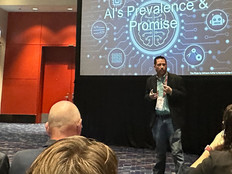Know Who Your Users Are
Technology is increasingly important for pinpointing, isolating and distinguishing microtargeted customer segments. Progressive higher education institutions will rely on Big Data to uncover market opportunities and customer preferences. Big Data can help to better define and delineate the educational needs of both traditional and nontraditional students.
MORE ON EDTECH: Learn how higher ed can use data analytics to boost admissions.
Know What Your Users Need
Yesterday’s prepackaged majors are giving way to bespoke educational programs, with students building curricula to meet their specific needs. Cloud computing and Big Data management can break down long-standing informational silos to connect students, faculty and institutions in expanding learning ecosystems. As universities band together to establish knowledge, resources and geographic synergies, they’ll need sophisticated IT systems to collaborate in a way that makes the whole worth more than the sum of its individual parts.
Adapt and Provide Individualized Help For Users
Over the past 100 years, the U.S. educational system has evolved from the multigrade, multiage schoolhouse to defined stages of learning. Using artificial intelligence, adaptive learning systems hold the promise of pedagogical approaches that adapt to an individual’s specific level, pace and style of learning. Traditional courses such as Psychology 101 might be replaced by personalized psychology courses tailored to a specific person.
MORE ON EDTECH: Improve online learning — and more — with artificial intelligence.
Know How Long Your Users Want To Be In School
The notion that it takes four years to get a college education has been dispelled. The traditional undergraduate campus experience will still attract particular students, but others may choose shorter, more specialized trainings accessible at different stages of their careers and lives. With the growing popularity of stackable certificates, microcredentials and digital badges, we’ll need IT systems and protocols to keep track of issuers, recipients, issue dates and categories.
For these credentials and also traditional degrees, blockchain-enabled contracts can ensure authenticity and simplify portability and accessibility.
MORE ON EDTECH: Learn how universities can use blockchain to streamline student services.
Streamline Tech To Meet Users Where They're At
Videoconferencing has become the de facto standard for delivering online education. Even so, this is a short-term solution, and its shortcomings are becoming apparent.
Already drawing administrators’ attention are new online platforms built with education science in mind. As 5G mobile networks take hold, the vastly improved speed of data transfer will help realize the promise of the Internet of Things, virtual reality and augmented reality. No longer tied to traditional computer screens, students can engage in a more enriching, multiplatform, fully mobile, community-based learning experience.
With new competitors diverting revenue from traditional higher education, universities must prioritize their IT infrastructure. Technology must serve a greater purpose than streamlining inefficiencies and lowering costs. By addressing who, what, how, when and where, institutions can create a much more compelling value proposition.











